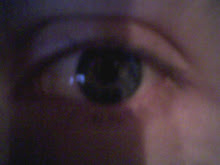* * * * *
V I
* * * * *
Karen tried to sleep. Miles had quickly passed out on the couch, the irritating hiss of the television droning on the background. She was grateful it was only barely audible from the back bedroom where she lay, eyes wide open. She had managed to sleep for about an hour, before a series of disturbing dreams jolted her awake. The window was open, but the desert was deadly quiet, not a sound drifted in from the empty horizon. The sky outside the window was pure black, even the stars seemed to have abandoned her.
Her conversation with Miles earlier in the evening haunted her. Of course life had purpose. Of course God had a plan. She found she was deeply and profoundly disturbed by the idea; she tried to dismiss his philosophy as the rant of a lonely and intoxicated man, but here she was – alone and tired and stripped of her illusion. Here she was, with the one man she thought could provide her with answers, and he was pushing her away. Here was a man with a gift she didn’t fully understand, and he had no intention of helping her.
The only man, perhaps, with answers – but not the only one: God still stood by her. But even that notion seemed hollow. Where had God been when her husband’s spine was crushed and he bled out in the street? Where was God when her children were trapped in the van, scared and injured and alone, only to both die in the hospital? When she was pinned behind the steering wheel, hurt and unable to help, unable to save her children, unable to…
Why was she spared?
The man – Miles, she corrected herself. He has a name. The man’s name is Miles. Miles knew his would happen. No, she thought, he knew something else. He told her she would die. But something had changed, hadn’t it? She had changed something.
God’s plan is infallible. He is in all things; His will be done – on earth as it is in heaven.
What did that even mean?
Still, she had purpose. She had a place in God’s world.
She was…
She stopped. Everything she was had been taken away. She was a wife and a mother, and now…
Karen began to cry again, quiet sobs, not letting herself think any more. She would try and sleep. In the morning she would go home. Her trip had been a wasted effort, a journey to nowhere to find someone uninterested in being found. Miles would not help her. He was right, there was little he could do. And everyone else was right as well: the nurses, her sister-in-law, the therapist she had seen for the weeks following the accident. There was nothing she could have done, they said. It wasn’t her fault. There was nothing she could have done. His kingdom come. His will be done.
She had taken the wheel, she thought. She had changed something.
She had taken the wheel – the realization hit her like a blow to the chest, knocked her breathless. Gasping, she clutched her breast, and the memory of the trip flooded back.
She had taken the wheel. She had asked to drive. When she saw the highway marker, after meeting Miles in the bar. Paradise, he had said. She thought she’d be safer. She thought she’d be able to protect her husband and her children. The thought had been fleeting; the feeling of danger had been dismissed. But she had known. She had tried, and she had failed. She wouldn’t make it to Paradise.
She was supposed to die. Miles knew; he tried to warn her, and she wasn’t ready to listen, wasn’t able to understand. John was supposed to live – John, the caring and handsome man she’d loved her whole adult life. She was supposed to die with her children, and John was supposed to survive the accident. He was the strong one, he’d find a way to carry on. He’d know how to bear the grief, how to live a normal life, how to stand against the angry tides of time. She needed him. Without John she was lost. Without Michael and Gabriel, there was no reason.
She couldn’t bring herself to pray; she couldn’t bear the thought that no one would answer. A cold wind drifted in from outside – finally she stood, crossed the room, and closed the window with a decisive heave.
A course of events had been set in motion, an intended sequence that she had interrupted. She, in her fallible human way, had thought herself able to steer the course if history, but had only succeeded in leaving herself alone, in casing herself out of the light that was God’s intended plan.
Slowly the idea crept in, soaking her like water in the parched desert. Slowly, the idea took her, rising her up above the tangibility of her grief until she could barely feel anything. She had no place here. God had not intended her to survive.
His will be done, on earth as it is in heaven.
